Aoa Everyone,
My name is Zoha Shakir. I got allocation in PAS through CE 2016. Today I’ll be sharing my experience regarding CSS, how I cracked CSS in my 1st attempt and what are the basic requirements to ace competitive exams. I hope this post will be beneficial for aspirants.
-
English Essay
My Take on English Essay:
Essay is the test of English writing skills so it should be tackled accordingly. The examiner is much concerned about the language you’re using throughout the length of your essay rather than the knowledge you’re trying to show off so be very careful what you write in your essay. Some of the things you’re being tested for are:
- Your knowledge of the topic;
- Your argumentative and opinion based writing skills;
- Your grip over English grammar and vocabulary;
- The organization of whatever you put on the paper;
- Clarity of expression;
- Flow/Fluency in your writing;
- The outline you make;
- Your presentation;
- Whether you have corroborated your opinion or stance with relevant stats or not.
Essay writing is not something that can be learnt overnight; one needs to practice a lot to learn this art. It is said that before running, one needs to learn to walk properly so for the beginners I recommend that they should start writing one-paged articles and get them checked by some competent and sincere teacher/senior. After that they should start drafting outlines on essay topics from the past papers as the pattern has changed in the recent times and now more creative and unique topics are being asked in the paper. After drafting outlines on diverse topics, you may start writing full length essays within the allocated time period of 3 hours.
Important Elements of English Essay:
I followed the following method while writing my essay and got 52 marks in it. I’m sure you will find it useful as well.
1. Outline:
Outline should be written in bullet form. The outline should be written strictly to the point.
2. INTRODUCTION:
In the Introduction, directly hit the topic without going into irrelevant details. Your Introduction should span around 85% of your 1st page. As Introduction gives a direction to your essay so it should be interesting and captivating; you can start your introduction with an interesting fact, an exciting quotation, a surprising piece of information, an anecdote or a provocative question. Your Introduction should be thought provoking and extremely relevant throughout. Present your thesis statement at the end of introduction.
3. BODY:
The sequence of your essay should be according to the outline that was written before essay. Connectivity is the essence of an essay. Your essay should be coherent and well organized. It should be holistic and multifaceted. You should critically analyze the various aspects of the topic. You can put your weaker arguments in the middle but you must never repeat your arguments as it gives a bad impression. Add relevant quotes, facts and statistics. Avoid spelling and grammatical mistakes. Do not use abbreviations like WAPDA; use the full form i.e. Water and Power Development Authority. There should be clarity of thoughts through the entire length of your essay which can be attained by writing according to the outline and using short sentences that are grammatically correct instead of going for long sentences filled with verbosity.
4. CONCLUSION:
Don’t introduce any new idea in the conclusion, justify the already stated content by explaining in a few sentences. Always conclude with a positive note.
How to Attempt the Essay Paper While Sitting in the Examination Hall
- Spend around 10-15 minutes choosing one out of ten given topics. Choose the topic which you can elaborate well and you believe you possess most knowledge about.
- Take around 45-50 minutes sketching a rough, crude outline. I recommend you draw it on the backside of the question paper because if you do it on the last page of answer sheet, you are going to have to ruffle through pages maniacally, while writing the essay, looking for points, every now and then. That is going to waste a lot of time and might take its toll on your mood. If you sketch it on the backside of the question paper, you can keep it in front of you, in your one hand, while writing the essay, reading the points and elaborating them on answer sheet.
Outline sketching is purely a function of brainstorming. The deeper, the wider you can think, the better is your outline. Give your thoughts free reign, do not restrict your mind, and do not refrain from putting on paper what you think. You might write irrelevant points but mere writing them might cause you to come up with a more relevant one. Explore various dimensions of the given issue, adding bits and pieces from every dimension, relating them to your essay statement, coming up with stats, examples etc to justify your stance.
Make sure your outline is VERY COMPREHENSIVE, make major headings (1,2,3…), sub headings (i, ii, iii …) and sub sub headings (a,b,c…) inside every major heading, just like you add bullet points in MS Word file. Also if possible, use different colored markers/fonts for Major headings, sub headings, and sub sub headings. (Mega font for major headings, minor font for sub sub headings). Such organized presentation will make it easily navigable for the examiner, plus will occupy lots of space, and will make your outline appear hierarchical and organized.
A detailed outline, spanning around 4-5 pages, means that if you can expand each point into 4-5 lines in your essay, you are easily going to cross 2500 words threshold. Plus, once you have a very detailed outline in front of you, you KNOW what you got to write, in what manner, and you will not have to write and pause to think and again write and again pause. This write-pause phase can be detrimental, do your best to avoid that, and the best way to avoid that is to chalk out a comprehensive outline.
Practise drawing outlines of difficult and philosophical topics which are as distant from current affairs, as possible. If you can develop outlines for such topics, you can cream the current affairs topics.
- Once done with outline, leave few pages on the answer sheet, and start with your essay. Elaborate each point in your outline in around 5-7 lines, starting from Intro to Conclusion. This should not take more than 1.5 hours. While writing the essay you will come across many points which you did not write in your outline. As it happens, include those points in the rough outline.
- With half hour at your disposal, now come to the beginning of your answer sheet where you left blank pages and transfer the outline on those pages. The point of doing this exercise in the end is that you will come across many points while inking the essay, and had you written the outline right at the beginning, you would miss those points. When you write the outline later on, it will include the points you missed while sketching the outline and conceived later on.
The very best of luck to all of you. Essay, no doubt, is bane of every CSS aspirant’s existence, but you got to take it by the scruff of the neck rather than allowing it to get better of you. There is either Do or Die, no middle path, I suggest you take the former
Why and How To Read Newspaper For CSS
First of all, I’ll tell you “WHY” you need to read newspaper. Newspaper reading helps a person to stay in touch with current issues around the globe. It helps to broaden the perspective and analytical skills of the reader. When a person is reading Op-eds written by eminent writers of Dawn, The News, NY Times, Guardian etc., he learns to analyze the opinions of experts and then he is able to formulate his own opinions which are unique. When he jots down his unique ideas in his papers, the examiner gets impressed by the versatility of his ideas and resultantly he scores more than others. So, there is a marked difference in the written expression of a person who reads newspaper and the one who doesn’t read it.
For CSS aspirants, the importance of newspaper can’t be more emphasized as it helps in both compulsory and optional subjects. The quality material that a person can get from newspaper has no parallel and this valuable information can easily be reproduced in Essay, Pakistan Affairs, Current Affairs, Islamiat, International Affairs , Political Science or any other paper. The statistics, quotes, opinions, facts and figures quoted in the newspaper are the latest ones and reading them saves a lot of time as you can easily note them down while reading paper instead of searching them on google separately.
From the past five years, there has been a rapid shift in the pattern of question papers. Gone are the days when a person could memorize the top 20 questions from each subject and pass CSS. Nowadays, competitive exams demand more creativity and analytical reasoning which can only be developed by reading vigorously. The way you comprehend what’s being asked in the paper and the way you write down your answer determines your fate in CSS. Having said that, it’s not difficult to develop a sound written expression which can easily be learned by reading quality papers and writing more and more. By practicing this, you can easily learn to write an opinion based answer during exam under immense pressure of time and nerves.
To be honest, when I started reading newspaper I used to feel that it’s a sheer wastage of time as I was unable to comprehend what was written in there and it used to take a lot of my time. But gradually I started enjoying reading it and now it’s my habit to read Dawn newspaper daily. You all might have experienced this and it’s normal that at first you won’t be able to maintain interest while reading newspaper but gradually you will start enjoying it. At this stage, you might not find it beneficial but the massive information and statistics that you read right now will make its way to your sub-conscious and you’ll be surprised to notice that you’ll be able to produce quality material you never knew in the exam hall; It comes through constant reading of good articles from reputable newspaper. To sum it up, there’s no alternative to newspaper reading.
Now moving on to the “HOW” part. When I started reading it used to consume a lot of my time as I didn’t know what was supposed to be read. For beginners I’ll recommend DAWN newspaper because of its unbiased opinions. The portions that you need to read include:
- Front and Back page to know about the current national events.
- Editorials and Opinions to develop your own opinions regarding all national and international events. (You can even take an article from the op-eds and make its precis daily, this activity will help you in both Current Affairs and English as it will improve your written expression).
- The Friday Article in Dawn newspaper helps a lot in Islamiat paper as it helps in formulating a reasonable opinion on pertinent religious issues.
- The International pages to stay in touch with International Affairs (As majority of you now have either IR or Political Science so these pages are a must-read).
- The business page to stay in loop with the state of global economy; Monday’s supplement on economy is very helpful to get an understanding on economic issues of Pakistan (This one is especially important for those who have Economics or Business Administration as one of their optionals)
- Finally, in Sunday’s “Images”, articles by Nadeem Paracha, Anjum Niaz and Mubarak Ali are very well-written as they are well researched and cover a lot of topics like social issues, terrorism, national security issues etc.
- Now after reading this stuff if your mind gets overburdened you may take a tea break and read your horoscope on the metropolitan leisure page; you’ll get to know that your future is bright and something great is going to happen
Lastly, I’ll tell you about “How to make notes from Newspaper” from examination point of view. You’ll be reading newspaper for months before exams but you won’t be able to revise whatever you read. So for revising some articles you may cut them and save those clippings in a folder or you may paste those articles on a register. You may make separate segments in that folder/register and label them as:
- National events: you can make further breakdown like
- national security issues
- water crises,
- governance issues,
- criminal justice system reforms,
- CPEC progress,
- Progress on Panama Inquiry etc
- International events
- American Economic crisis,
- BREXIT,
- America after Donald Trump,
- Middle Eastern fiasco,
- South China Sea Disputes,
- War on Terror and IS,
- Rise of China and OBOR,
- Paris Climate Deal, etc.
- Economy
- Global financial crisis,
- Foreign Aid,
- Tax Avoidance and tax havens,
- Rise of new economies like BRICS etc.
- Geography
- food and agriculture Issues,
- climate change
- and global warming, etc.
- Social Issues
- “Friday Articles” and so on.
When you read an article, try to summarize it in one line and write that on top of it. Now whenever you feel like revising any topic you may take the clipped articles on that particular topic. It will save a lot of your time and by the end of the year you would have made your own special notes and you can circumvent all Dogars, IImis, Cram Series and JWT stuff. And believe me, hard work never gets wasted and you’ll be rewarded by Allah Almighty InshaAllah!
-
English (Precis and Composition)
The books I used include:
- Precis Writing by Prof. R. Dhillon
- Precis Writing by Zahid Ashraf published by JWT
- This book contains solved précis from CSS past papers- 1990 onwards; It’s very useful for those who are preparing by themselves at home like I did. You can easily solve any précis from past papers and then compare it with the solved one given at the end. This way you can judge yourself and rectify your mistakes
- Exploring the World of English by Sayed Saadat Ali Shah
- High School English Grammar & Composition by Wren & Martin
- This book can be used to cover parts of speech, nouns, verbs, pronouns, adjectives, tenses, correct usage of articles, adverbs, idioms, prepositions, conjunctions, interjections, active and passive voice, comprehension and rules for precis-writing)
-
General Science & Ability
The books I used include:
- Encyclopedic Manual of Everyday Science by Dr. Rab Nawaz Samo
- EDS by Hafiz M. Hamid Raza
- GAT Book
TIPS: Draw as many relevant diagrams, tables and flowcharts as you can in this paper. As it’s a scientific paper so you need to be scientific and avoid going into irrelevant details. In order to memorize various topics, you should make mnemonics. For example mnemonic device for 8 planets is “My very educated mother just served us noodles” So you can always use such techniques to retain information and it makes learning a fun based activity
-
Current Affairs
I collected information from the following sources:
- DAWN Newspaper
- The News
- The Diplomat
- Foreign Policy Magazine
- Center for Strategic and International Studies
- PILDAT
TIPS: In order to score high in current affairs, you need to present a SWOT analysis (strengths, weaknesses, opportunities and threats) for which you need to collect pros/cons regarding that particular topic. While writing an answer, briefly write about the historical background, then state the current developments after which you need to give the future predictions if the question demands. To beautify your answer, write sayings of world leaders and renowned authors for example I used a lot of sayings of Samuel P Huntington, Stephen P Cohen, George W Bush, Noam Chomsky, Dr Shahid Masood, Ahsan Iqbal, Mahmoud Ahmadinejad, etc.
-
Pakistan Affairs
The books I read include:
- Pakistan Affairs by M. Ikram Rabbani
- Trek to Pakistan by Ahmed Saeed
TIPS: Always keep in mind the current scenario/impact of various historical events for example, when you’re reading the 14 points of Quaid-e-Azam you need to critically analyze the impacts of Quaid’s 14 points in the future struggle for Pakistan. Add relevant sayings of Quaid-e-Azam, Allama Iqbal, Sir Syed Ahmed Khan and other important personalities where needed. Your answers should reflect your own opinion; it should not be copied from any book or notes. Use data and statistics from the economic survey of Pakistan. You should all learn how to draw a simplified map of the world, The Subcontinent, South Asia and Pakistan.
-
Islamic Studies
I read selected portions from the following books:
- Lost Islamic History by Firas Alkhateeb
- Islamiat by Farkhanda Noor Muhammad
- Islamic Studies by Hafiz Karim Dad Chughtai
- Islamic Studies by Zahid Ashraf published by JWT
- Towards Understanding Islam by S. Abul Ala Maududi
- Islam, Its Meaning and Message by Khurshid Ahmed
TIPS: Among the above mentioned books, I found the one written by Sir Hafiz Karim Dad the most comprehensive and in accordance with the revised syllabus. While answering the question, keep in mind not to overload your paper with references from Quran and Hadith, rather use relevant references to back up your arguments. Secondly, avoid criticizing any school of thought because you don’t know who’s going to check your paper.
International Relations
The books I read include:
- International Relations by Joshua Goldstein & Jon C. Pevehouse
- International Relations by Parkash Chander
- The Globalization of World Politics: An Introduction to International Relations by John Baylis, Patricia Owens, Steve Smith
- Politics in Minutes by Marcus Weeks
- The Clash of Civilizations by Samuel Huntington
- Foreign Policy of Pakistan by Abdul Sattar
TIPS: This is a technical subject and demands a technical approach. Cover the theoretical part well as it forms the base of your arguments. Consult multiple sources for this subject as there is no specific book for this subject.
Town Planning & Urban Management
The books I consulted include:
- Town Planning & Urban Management by Hassan Ali Gondal published by JWT
- Town Planning & Urban Management by Haji Muhammad Shabbir
NOTE: This is a technical subject so choose it only if you’re interested in this subject and willing to work hard. I found this subject very interesting and I believe it can give a pretty good score if prepared well. During my time, I couldn’t find any quality book on this subject but for scoring good one needs to consult international books written by subject specialists. Secondly, this subject demands a lot of creativity while solving paper so draw as many relevant flowcharts and graphical demonstrations as possible.
Environmental Sciences
I consulted the following books:
- Environmental Science by Imran Bashir
- Human, Economic & Regional Geography by Imran Bashir
TIPS: A very interesting and knowledgeable subject which can easily be prepared within 15 days. I used the above mentioned books but as the outline is quite extensive so I used to google the topics I couldn’t find in books. For scoring good in this subject, write to the point and make relevant diagrams. The latest international conferences on Environment/Pollution Control/Climate Change should be kept track of; for example when I was preparing for CSS, the Paris Climate Deal was recently signed so I followed the latest developments on it (like how many countries have signed or ratified this deal, what are the demands on those countries under this deal, what are the future expectations after its coming into force etc.) Moreover, latest statistics related to this subject should be quoted in the paper to score good.
International Law
I consulted the following books and website:
- International Law by DR. H.O. Agarwal
- International Law by J.G Starke
- International Law by Malcolm Shaw
- https://sites.google.com/site/walidabdulrahim/
TIPS: I found this subject very interesting so I used to study every topic in detail. Most of the topics can be covered from the above mentioned books; the remaining ones specially the important cases can be searched on Google/international journals.
Psychology
For psychology, I used the books mentioned below:
- Essentials of Understanding Psychology by Robert S. Feldman
- An Approach to Psychology by Rakhshanda Shahnaz
- Processes of Psychology and Applied Psychology by Prof. Zarin Bukhari
- Psychology by Tayab Saifullah (Jahangir Exam Cram Series)
TIPS: Make extensive use of internet for animations, graphs and critical analysis of psychological theories.
I hope this article helps you all in some way. Best of luck everyone! Just remember:
“Don’t ever let somebody tell you can’t do something.
You have got a dream, you’ve got to protect it.
People who can’t do something themselves,
they want to tell you, ‘You can’t do it.’
You want something? Go get it. Period!”
~ Will Smith, Pursuit of Happyness
Regards,
Zoha Shakir
(45th Common)
Courtesy: CSS Forum

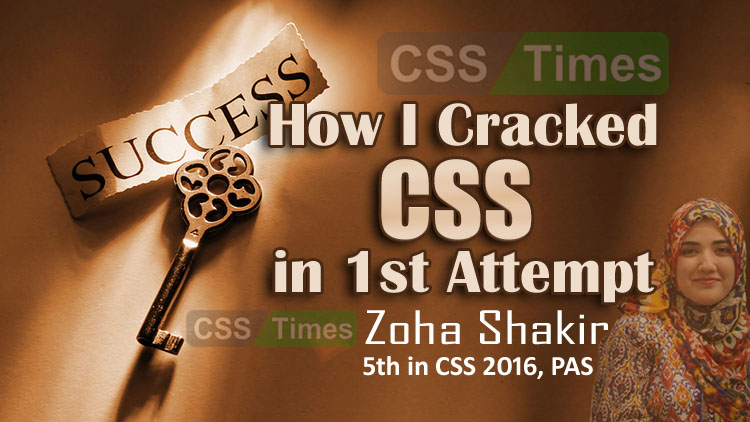
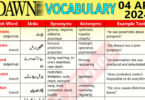
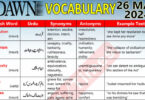
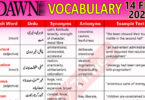
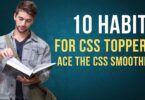

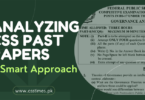
Thank you very much for this vital information.